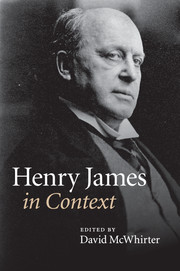Book contents
- Frontmatter
- Contents
- List of Illustrations
- Notes on Contributors
- Preface
- Abbreviations
- Chronology
- Part One Life and career, times and places
- Chapter 1 Nineteenth-century America (1843–1870)
- Chapter 2 Nineteenth-century Europe (1843–1900)
- Chapter 3 Victorian England (1870–1890)
- Chapter 4 Fin-de-siècle London (1890–1900)
- Chapter 5 The twentieth-century world (1901–1916)
- Chapter 6 Autobiographies and biographies
- Chapter 7 Letters and notebooks
- Chapter 8 The James family
- Part Two Historical and cultural contexts
- Part Three Reception
- Further reading
- Index
- References
Chapter 6 - Autobiographies and biographies
Published online by Cambridge University Press: 05 August 2014
- Frontmatter
- Contents
- List of Illustrations
- Notes on Contributors
- Preface
- Abbreviations
- Chronology
- Part One Life and career, times and places
- Chapter 1 Nineteenth-century America (1843–1870)
- Chapter 2 Nineteenth-century Europe (1843–1900)
- Chapter 3 Victorian England (1870–1890)
- Chapter 4 Fin-de-siècle London (1890–1900)
- Chapter 5 The twentieth-century world (1901–1916)
- Chapter 6 Autobiographies and biographies
- Chapter 7 Letters and notebooks
- Chapter 8 The James family
- Part Two Historical and cultural contexts
- Part Three Reception
- Further reading
- Index
- References
Summary
A writer who proclaims the ‘fatal futility of Fact’ (LC-2, 1140) would seem an unlikely candidate for a chapter on biography and autobiography. Yet James was deeply engaged with both genres. As implied by the title of Philip Horne’s Henry James: A Life in Letters (LL), his prolific correspondence is itself a mode of (auto)biography, and many other texts, including the journals, travel writings, the critical Prefaces and The American Scene, are overtly autobiographical and demonstrably ‘fictional’ in their rhetorical constructedness. Finally, James has attracted the attention of numerous gifted biographers. It proves impossible and undesirable to approach him without recourse to the biographical and autobiographical (inter)texts that suggestively shape, illuminate and deform our readings of him.
James’s career is book-ended by two biographies that reflect early and late authorial preoccupations. Hawthorne (1879) argues that his precursor’s location in antebellum New England rendered him a relative provincial. James posits the Civil War as a fortunate fall, positioning himself as the successor whose more sophisticated cultural moment enables the achievement to which Hawthorne could only aspire. His celebrated catalogue of ‘the items of high civilization, as it exists in other countries, which are absent from the texture of American life’ (‘No sovereign, no court, no personal loyalty, no aristocracy, no church, no clergy, no army, no diplomatic service, no country gentlemen, no palaces, no castles, nor manors’, to quote only a third of the list [LC-1, 351–2]), is a redaction of Hawthorne’s parallel complaint:
No author, without a trial, can conceive of the difficulty of writing a Romance about a country where there is no shadow, no antiquity, no mystery, no picturesque and gloomy wrong, nor anything but a common-place prosperity, in broad and simple daylight, as is happily the case with my dear native land . . . Romance and poetry, like ivy, lichens, and wall-flowers, need Ruin to make them grow.
- Type
- Chapter
- Information
- Henry James in Context , pp. 58 - 67Publisher: Cambridge University PressPrint publication year: 2010
References
- 2
- Cited by



